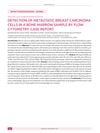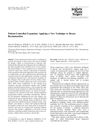 October 2010 in “International Journal of Dermatology”
October 2010 in “International Journal of Dermatology” An 86-year-old man with prostate cancer was diagnosed with a rare, low-grade breast cancer and underwent surgery but declined additional hormone therapy.
 September 2003 in “Journal of the Royal Society of Medicine”
September 2003 in “Journal of the Royal Society of Medicine” Understanding breast cancer requires considering both medical advancements and social influences.
 67 citations,
October 2005 in “Annals of Oncology”
67 citations,
October 2005 in “Annals of Oncology” Fulvestrant is a well-tolerated new treatment for advanced breast cancer that may delay chemotherapy.
 61 citations,
April 2009 in “British journal of dermatology/British journal of dermatology, Supplement”
61 citations,
April 2009 in “British journal of dermatology/British journal of dermatology, Supplement” Docetaxel and paclitaxel for breast cancer can cause permanent, severe hair loss.
42 citations,
January 2005 in “Applied spectroscopy” Hair from breast cancer patients shows changes in structure and composition, and a test using these changes detected cancer but also falsely identified some healthy samples as cancerous.
23 citations,
October 2007 in “International journal of cancer” X-ray diffraction of hair might help detect breast cancer non-invasively.
17 citations,
May 2019 in “Journal of International Medical Research” Xiaoaiping reduces chemotherapy side effects and improves quality of life for breast cancer patients.
 15 citations,
July 2023 in “EClinicalMedicine”
15 citations,
July 2023 in “EClinicalMedicine” ADCs can effectively treat breast cancer but may cause side effects like nausea and hair loss.
 6 citations,
January 2010 in “Neoplasma”
6 citations,
January 2010 in “Neoplasma” Certain gene patterns in breast cancer are linked to how active hormone receptors are and could affect patient survival.
 5 citations,
June 2022 in “Frontiers in Endocrinology”
5 citations,
June 2022 in “Frontiers in Endocrinology” Research from 2011 to 2020 shows androgen receptors could be key for prognosis and treatment in certain breast cancers.
5 citations,
May 2022 in “Clinical & Experimental Metastasis” Minoxidil and ranolazine together can reduce the spread of certain breast cancer cells.
 3 citations,
November 2022 in “Advances in Clinical and Experimental Medicine”
3 citations,
November 2022 in “Advances in Clinical and Experimental Medicine” Electric pulse treatments for breast cancer show promise in being safer and more effective, with fewer side effects.
 2 citations,
December 2013 in “Cancer Research”
2 citations,
December 2013 in “Cancer Research” Some early breast cancer patients have long-term hair loss after chemotherapy, especially older and postmenopausal women.
2 citations,
December 2013 in “Cancer research” Enobosarm may effectively treat androgen receptor-positive breast cancer with fewer side effects.
 2 citations,
May 2012 in “Annals of Oncology”
2 citations,
May 2012 in “Annals of Oncology” Patients with advanced breast cancer and high hormone receptor levels who had surgery for ovarian/pelvic metastases lived longer, especially if they had high estrogen receptor levels.
 1 citations,
September 2020 in “Endocrinology, Diabetes & Metabolism Case Reports”
1 citations,
September 2020 in “Endocrinology, Diabetes & Metabolism Case Reports” The conclusion is that thorough investigation of hypertension and hormonal dysfunctions is important, and there may be a link between these conditions and cancer.
 1 citations,
November 2019 in “Archives of breast cancer”
1 citations,
November 2019 in “Archives of breast cancer” Some hormone treatments might raise breast cancer risk, while others don't seem to.
 1 citations,
August 2017 in “Semiotica”
1 citations,
August 2017 in “Semiotica” The paper concludes that breast cancer treatment involves complex interactions between medical symptoms, patient experiences, and commercial influences, requiring a holistic approach.
July 2021 in “Plastic and reconstructive surgery. Global open” Radiation therapy in breast cancer patients changes gene expression related to DNA damage, fibroblast growth, and hair follicle development, which could help improve treatment for radiation-induced fibrosis.
 January 2020 in “Mastology”
January 2020 in “Mastology” Flow cytometry was effective in diagnosing metastatic breast cancer in a bone marrow sample.
January 2016 in “Journal of clinical case reports” Docetaxel treatment for breast cancer can cause permanent hair loss.
May 2015 in “Cancer research” After chemotherapy for early breast cancer, 33.4% of patients had long-term significant hair loss, with some hair regrowth over time, but treatments for hair loss were largely ineffective.
 May 2012 in “Journal of Clinical Oncology”
May 2012 in “Journal of Clinical Oncology” Taking 5-alpha reductase inhibitors might be linked to breast cancer in men.
 67 citations,
April 2018 in “JAMA Dermatology”
67 citations,
April 2018 in “JAMA Dermatology” Hair loss from hormone therapy in breast cancer patients can be improved with minoxidil treatment.
 21 citations,
March 2019 in “Critical Reviews in Clinical Laboratory Sciences”
21 citations,
March 2019 in “Critical Reviews in Clinical Laboratory Sciences” The androgen receptor is a promising target for breast cancer treatment, especially in triple-negative cases, but more research is needed for personalized therapies.
 15 citations,
June 2014 in “Integrative cancer therapies”
15 citations,
June 2014 in “Integrative cancer therapies” Pranic meditation significantly improved mental health and quality of life for breast cancer survivors.
 13 citations,
August 1980 in “Cancer”
13 citations,
August 1980 in “Cancer” Multimodal primary treatment improves survival in premenopausal breast cancer patients and is also beneficial for postmenopausal women.
12 citations,
February 2019 in “Journal of patient-reported outcomes” Patients with HR+/HER2- advanced breast cancer commonly experience fatigue, hair loss, and pain, which significantly affect daily activities.
 10 citations,
September 2021 in “JAMA Dermatology”
10 citations,
September 2021 in “JAMA Dermatology” Different types of persistent hair loss after chemotherapy respond differently to treatments.
 10 citations,
April 2007 in “Aesthetic Plastic Surgery”
10 citations,
April 2007 in “Aesthetic Plastic Surgery” The new patient-controlled expansion technique for breast reconstruction is safe, efficient, and cost-effective.





















